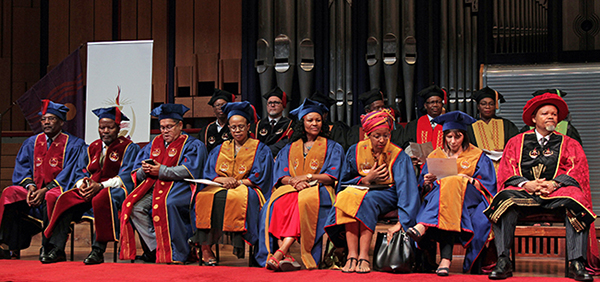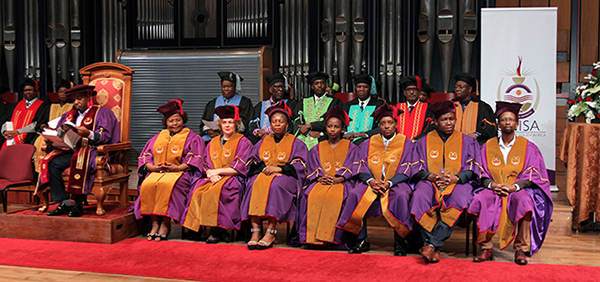
Prof Mandla Makhanya, Principal and Vice-Chancellor of Unisa, officially opened the university's 2020 academic year on 14 February 2020 and took the platform to address the university's annual vision. Placing considered emphasis on service delivery as well as various issues facing students, he said, "I would like to remind us all that individually and collectively we are the face of Unisa, especially in our engagement with students and members of the public - who are very quick to voice their delight or disgust at our conduct and apply pressure accordingly. So, when you perform well so does Unisa."

Prof Mandla Makhanya, Principal and Vice-Chancellor, with members of Unisa's Executive Management
Makhanya said 2020 would be the year of growing and developing the academe. As the largest open, distance and e-learning (ODeL) university on the continent and one of the largest in the world, Unisa is, in many respects, a trend setter when it comes to the innovative delivery of ODeL and it is looked up to as an exemplar by many developing nations across the world. In this regard, Makhanya stressed that Unisa had a dual imperative: achieving national and global relevance and quality in regard to its academic offerings, and, flowing from that, producing a calibre of 21st century graduates who would be able to navigate the world of work and business with confidence because they had the requisite skills and because they had taken on board a mindset of lifelong learning that would ensure that they were comfortable with upskilling and reskilling as the need arose.
Setting the agenda for the year, Makhanya said, "It is my intention and my directive - which has the concurrence of my management and our Council - that this year is a year in which we will devote our energies to growing and developing the academe. This directive colleagues, applies to the whole university."
The VC stressed that with each passing day there was a growing realisation that universities had to re-conceptualise their social contract to prepare and equip their citizens for the world that was emerging from the Fourth Industrial Revolution (4IR).
Makhanya emphasised that Unisa would need to reassert and prove its value in, and to, society, and to the parents and students who had placed their trust in it, especially when it claimed to be shaping futures in the service of humanity. "This means refocusing on our core mandate: teaching and learning, community engagement, and research and innovation. I therefore am serious when I say that the whole university needs to ensure that our academics are given the space to do what they have been trained and appointed to do - usher well educated and equipped students into the world of the Fourth and future revolutions: students who are both critical and socially responsible citizens," he said.
Makhanya committed to halting unsavoury practices in their tracks and to giving the academe a much needed "shot -in-the-arm" - a booster that would galvanise Unisa into action and break the current apathy that unfortunately overshadows the fantastic work that is being done by so many other colleagues.
The Chairperson of Council, Sakhi Simelane, agreed with Makhanya. "This year, as the VC has already indicated, will be a busy year. The Higher Education Quality Committee (HEQC) will be conducting an audit of the university to see whether our systems, policies, procedures are in line with quality enhancement strategies as set by this important statutory body," he said.

Sakhi Simelane, Chairperson of Council (left), with members of the Council in the front row
Simelane noted that Unisa is completing its first five-year period of implementing the 2030 strategy. "We will therefore be revising the current strategy to align it with the challenges the university is experiencing as well as ensuring that we focus more on being a genuinely African ODeL institution," he said. Like Makhanya, the Council Chair stressed that the move to implement the ODeL model was critical in view of the need to incorporate the 4IR.
Another critical issue for 2020, from a Council perspective, was for the university to make a concerted effort to improve the student experience, including making infrastructure accessible, safe, secure and appropriate. Simelane further encouraged staff to rethink their loyalty to the institution and commitment to students, as well as to pay attention to the urgent restoration of the Unisa brand in the public. He stressed that this was critical as Unisa is a major contributor to the South African knowledge economy.
A great point of excitement at the ceremony was the announcement that at the end of 2019 Unisa’s Council had approved the establishment of the Thabo Mbeki School. This is the leading school offering African-centred knowledge and scholarship in governance, diplomacy and state affairs with a view to achieving the African Renaissance and unity. It is the first of its kind on the African continent and is in the same league as the Kennedy School at Harvard University.
To conclude, Makhanya encouraged Unisans to commit to an academe that has an appreciation of abundant opportunities that could be tapped into, an advance that is admired and respected by peers, parents, students and the sector. "I believe that if we all work together, we can do it," the VC concluded.
* By Tshimangadzo Mphaphuli, Senior Journalist, Department of Institutional Advancement
Publish date: 2020-02-18 00:00:00.0